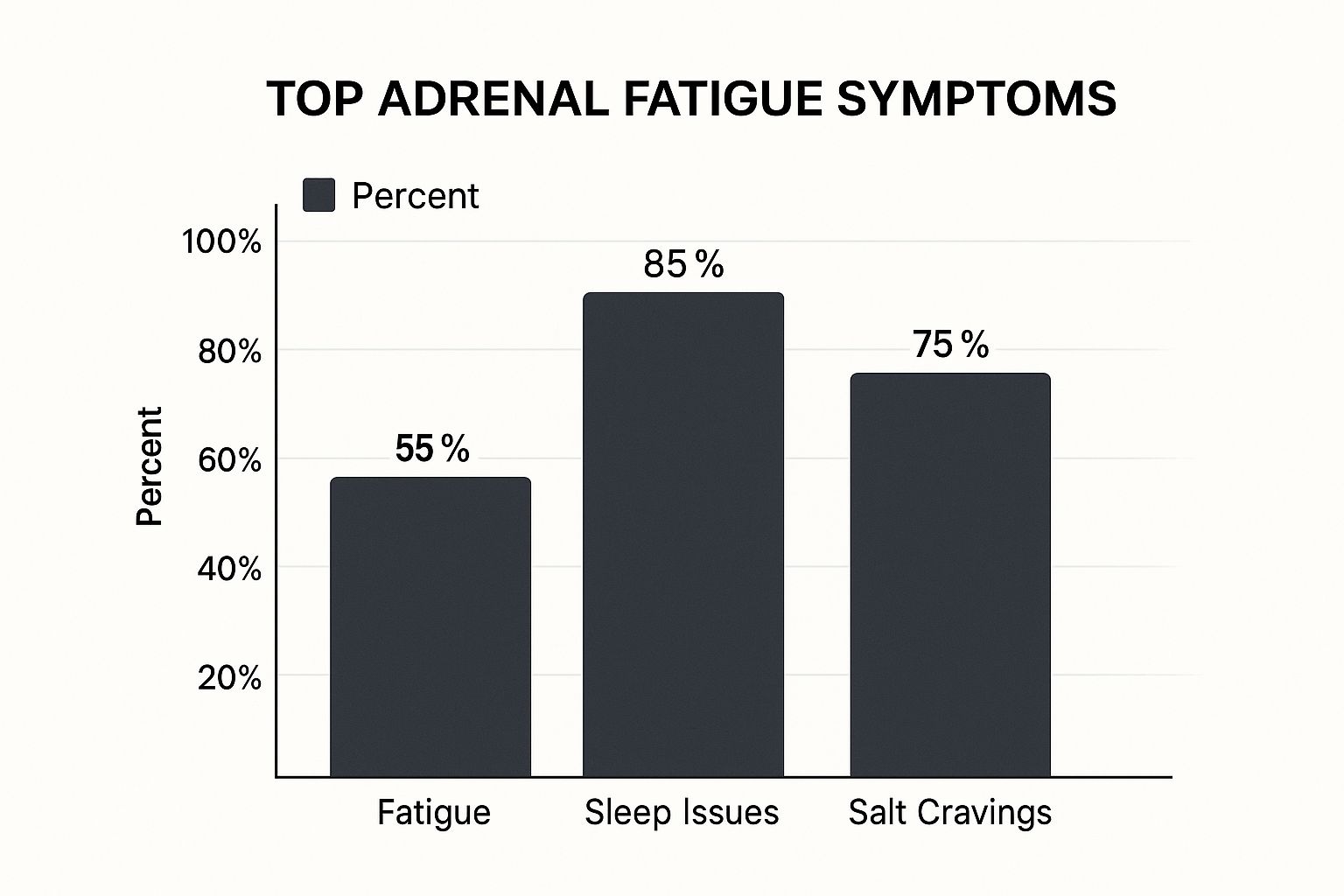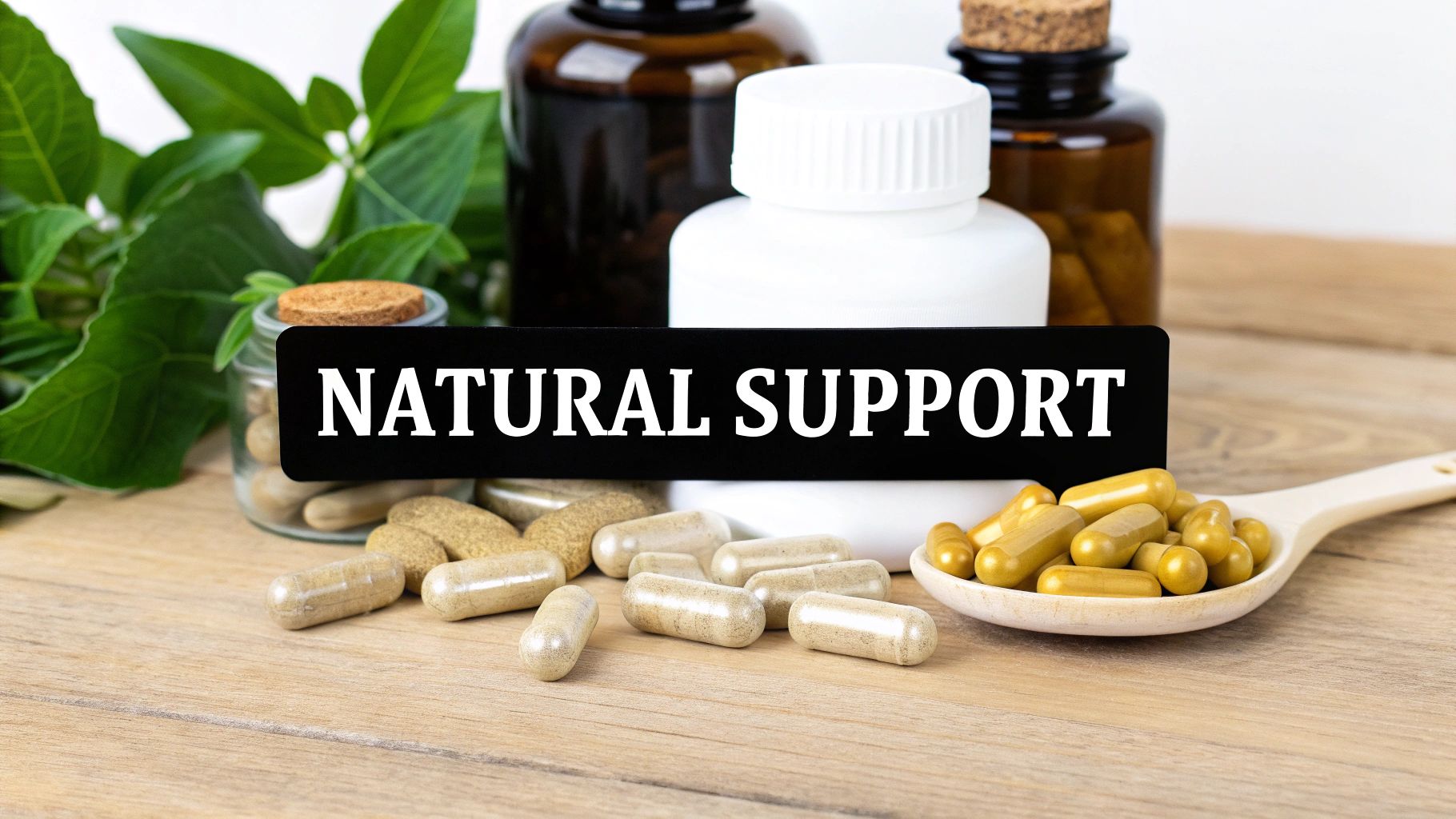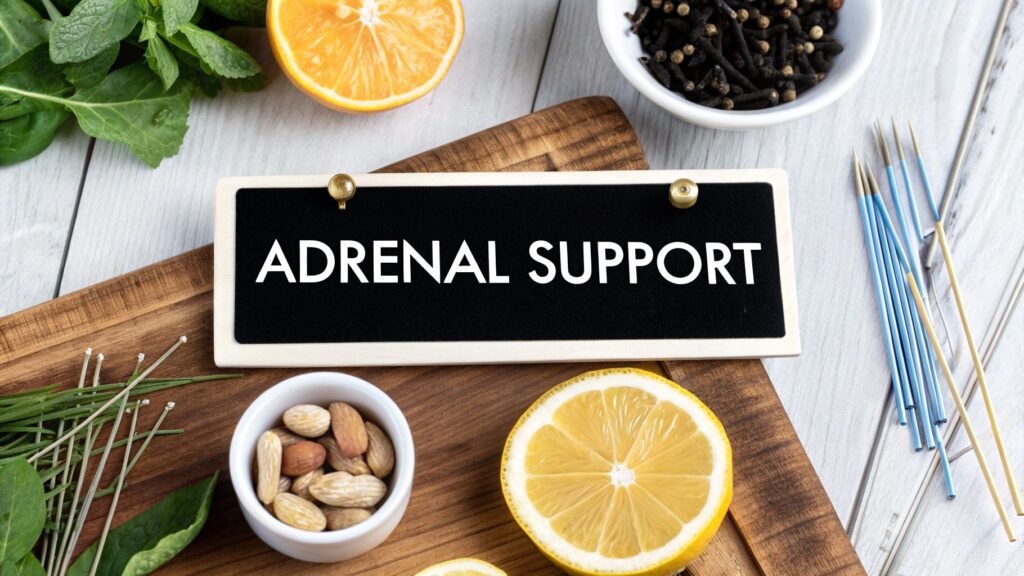Supporting your adrenal glands is about much more than just popping a supplement; it's a comprehensive approach that targets stress management, better sleep, and a nutrient-rich diet. Think of it as nurturing the entire ecosystem that governs your body's response to stress, not just patching up the symptoms.
What Does It Really Mean to Support Your Adrenals?
Before we jump into the "how-to," let's get clear on what "adrenal support" actually involves. This isn't about targeting one specific organ in isolation. It’s about bringing balance back to a sophisticated communication network called the hypothalamic-pituitary-adrenal (HPA) axis. This axis is the command center for your entire stress response.
Your adrenal glands, two tiny but mighty glands perched on top of your kidneys, are central figures in this network. They're the ones producing the hormones, most famously cortisol and adrenaline, that dictate how you handle everything from a looming deadline to a sudden emergency.
The Job of Your Stress Hormones
When you encounter a stressor, your HPA axis kicks into high gear, signaling your adrenals to release a cascade of hormones. This surge is what primes your body for action. To really get a handle on adrenal support, you first have to appreciate how this system works. For a closer look at this fundamental survival mechanism, I'd recommend reading more about understanding the fight-or-flight response.
This is a brilliant system designed for short, acute bursts of stress. The real trouble starts when the stressor never goes away, leaving your HPA axis stuck in the "on" position.
Adrenal support isn't a quick fix. It's about consistently giving your body the fundamental resources it needs—deep rest, proper nutrition, and a sense of calm—to recalibrate its stress response system on its own terms.
Medical Conditions vs. Wellness Concepts
It’s crucial to distinguish between medically recognized adrenal diseases and the more common wellness-related terms you might hear.
On one hand, you have serious, diagnosed conditions like primary adrenal insufficiency, also known as Addison's disease. This is a rare autoimmune disorder requiring specific medical intervention, affecting an estimated 110 to 144 people per million in developed nations. You can find more clinical details about adrenal insufficiency on barrowneuro.org.
On the other hand, the term "adrenal fatigue" is often used in wellness circles to describe a state of burnout and deep exhaustion. While it isn't an accepted medical diagnosis, the symptoms people experience are very real. They almost always point to HPA axis dysregulation—a system thrown out of whack by chronic, unrelenting stress.
Ultimately, learning how to support your adrenals means getting to the root of the problem: chronic stress. The goal is to build a lifestyle that fosters true resilience. This guide will walk you through practical, actionable strategies in nutrition, lifestyle, and targeted support to help your body find its natural equilibrium again.
Nourishing Your Body for Hormonal Balance
https://www.youtube.com/embed/IoAGKwEhU5I
What you put on your plate is far more than just fuel; it's information. The food you eat sends direct signals to your body, orchestrating your hormonal symphony and building your resilience to stress. When you're looking for ways to support your adrenal glands, nutrition is the most powerful and accessible place to start. This isn’t about strict, punishing diets. It's about consistently giving your body the raw materials it needs to handle pressure with grace.
A cornerstone of this approach is keeping your blood sugar stable all day long. The wild peaks and valleys caused by sugary snacks or skipping meals are a massive stressor. Every time your blood sugar plummets, your adrenals get the emergency call to pump out cortisol and bring it back up. This adds a heavy, unnecessary burden to an already overloaded system.
Timing And Composition Matter
One of the most impactful habits you can build is eating a balanced meal soon after waking. A breakfast packed with protein, healthy fats, and fiber creates a stable foundation for the day. It helps you sidestep that dreaded mid-morning energy crash that usually has you reaching for another cup of coffee or a sugary fix.
Try to build a balanced plate for every meal. Think of it as a simple, effective framework:
- Protein: This is essential for building the neurotransmitters and hormones that govern your mood and energy. I always recommend lean meats, fish, eggs, and quality plant-based options like legumes and tofu.
- Healthy Fats: Don't fear fat! It's absolutely crucial for hormone production and taming inflammation. Avocados, nuts, seeds, and extra virgin olive oil are your best friends here.
- Complex Carbohydrates: These provide a slow, steady release of energy, unlike the quick spike and crash from simple sugars. Load up on sweet potatoes, quinoa, brown rice, and a wide array of colorful vegetables.
Adopting this way of eating helps you get off the energy rollercoaster that drains your adrenal reserves. The symptoms of adrenal fatigue are very real, but they often trace back to these fundamental nutritional imbalances. This is why addressing what and when you eat is so critical.

As you can see, overwhelming fatigue, poor sleep, and intense cravings are the most common complaints. The good news is that these are the very symptoms a strategic, supportive diet can directly help you manage.
Micronutrients That Make A Difference
When you're under chronic stress, your body burns through certain vitamins and minerals at an accelerated rate. Keeping these micronutrients topped up isn't just helpful; it's non-negotiable for adrenal recovery. I've seen firsthand in my practice how focusing on just a few key nutrients can make a world of difference.
Here's a quick look at the most important players and where you can find them.
Key Nutrients for Adrenal Health and Their Food Sources
| Nutrient | Role in Adrenal Function | Excellent Food Sources |
|---|---|---|
| Vitamin C | The adrenal glands have one of the highest concentrations of Vitamin C in the body. It’s essential for making cortisol. | Bell peppers, citrus fruits, broccoli, strawberries, kiwi |
| B Vitamins | These are the spark plugs for your energy production and are vital for creating mood-regulating neurotransmitters. | Leafy greens, eggs, salmon, beef, legumes, nutritional yeast |
| Magnesium | Often called the "calming mineral," it helps regulate your entire stress response system (the HPA axis) and cortisol output. | Spinach, almonds, pumpkin seeds, dark chocolate, avocado |
Getting these nutrients from whole foods should always be your first line of defense. A diet high in processed foods, refined sugars, and excessive caffeine actively works against you by fueling inflammation and throwing your hormones out of whack.
My Clinical Takeaway: Prioritizing these nutrients through whole foods is the first and most important step. A diet filled with processed foods, refined sugars, and excessive caffeine works directly against your efforts by promoting inflammation and hormonal imbalance.
To support your body on a deeper level, consider adding sources of natural probiotics for optimal health. A healthy gut is intrinsically linked to a healthy stress response. And if you're interested in another time-tested perspective on the connection between diet, stress, and mood, you might find it helpful to learn about traditional Chinese medicine for anxihttps://drerictsai.com/f/%F0%9F%A7%8D%E2%80%8D%E2%99%82%EF%B8%8Feric-tsai-lac-msaom-bpharm#44cae461-999c-4ec1-82f4-fe3dbdc25492/traditional-chinese-medicine-for-anxietyety.
By focusing on a nutrient-dense, whole-foods diet, you provide your body with the stability and resources it needs to not just cope, but to truly recover and build lasting resilience.
Building a Lifestyle That Reduces Adrenal Strain

While targeted nutrition lays a powerful groundwork, your day-to-day lifestyle is where the real work of adrenal support happens. Chronic stress is the main driver behind HPA axis dysregulation, and frankly, no amount of superfoods can fix a lifestyle that constantly keeps your body in emergency mode. To truly support your adrenal glands and build lasting resilience, you have to make intentional shifts in your daily habits.
It helps to think of your body as keeping a running tab of all stressors, both big and small. That demanding job, family obligations, the constant phone notifications, and even that intense workout you think is "healthy"—they all add to the load. To ease this strain, you must consciously build in periods of genuine rest and recovery.
The Non-Negotiable Role of Sleep
If I had to pick one thing that’s absolutely critical for adrenal support, it would be sleep. This is when your body does its most important repair work, clearing out metabolic waste and recalibrating hormonal rhythms. When you don't get enough sleep, your body perceives it as a major threat, forcing your adrenal glands to work overtime just to get you through the day.
A consistent and restorative sleep schedule isn't just a nice-to-have; it's paramount. A simple, practical step is to protect your natural melatonin production. It's worth exploring how blue light glasses can enhance rest and sleep quality as one tool in your arsenal.
Here are a few things you can do tonight to improve your sleep hygiene:
- Create a Digital Sunset: Power down all screens—phones, tablets, TVs—at least 60-90 minutes before you plan to sleep. The blue light they emit directly suppresses melatonin, the hormone that tells your body it's time to wind down.
- Stick to a Schedule: Going to bed and waking up around the same time every day (yes, even on weekends) helps regulate your body's internal clock, also known as your circadian rhythm.
- Optimize Your Environment: Your bedroom should be a sanctuary for sleep. Think cool, dark, and quiet. If you need them, blackout curtains and a white noise machine can make a world of difference.
The scale of this problem is massive. It's estimated that 50-70 million Americans suffer from chronic sleep disorders. This widespread sleep debt is a significant, and often overlooked, contributor to systemic stress and hormonal imbalance.
Reimagining Your Relationship with Exercise
Movement can be a fantastic stress reliever, but the type of exercise you choose matters immensely when your system is already running on fumes. Pushing through grueling, high-intensity workouts when you feel exhausted can be counterproductive. It just becomes another major stressor that further taxes your adrenals.
Instead of an all-or-nothing approach, shift your focus to restorative movement. Choose activities that energize you rather than drain you. Gentle strength training, yoga, and tai chi are all excellent options. One of the most underrated forms of exercise is simply walking, especially outdoors. Time in nature has been repeatedly shown to lower cortisol and calm the nervous system.
Actionable Stress-Reduction Techniques
Managing stress isn't about eliminating it entirely—that’s an impossible goal. It's about building a toolkit of practices that help you navigate challenges without your body sounding the physiological alarm every time. The good news is these techniques don't have to be complicated or time-consuming to work.
Integrating simple mindfulness practices, like a five-minute deep breathing exercise or a brief meditation, can significantly lower cortisol levels. If you find your mind racing with anxious thoughts, you might find some useful strategies in our guide on how to reduce anxiety naturally. The key here is consistency. Even just a few moments of intentional calm each day can make a profound difference over time.
Using Adaptogens and Supplements Wisely

While a solid foundation of good nutrition, deep sleep, and stress management is non-negotiable, certain supplements and herbs can give you that extra, targeted support you need. Think of them as strategic allies, helping to fill in nutritional gaps and shore up your body's natural resilience.
The key is to approach them wisely. It’s not about finding a magic pill, but rather using these tools to complement the healthy lifestyle changes you’re already making. You’re essentially adding a turbocharger to an engine you've already been tuning up.
Understanding Adaptogenic Herbs
Adaptogens are a truly special class of plants. Their superpower is helping your body adapt to stress, whether it's physical, chemical, or biological. What I find most fascinating about them is their normalizing effect—they can help calm you down without making you drowsy or boost your energy without making you jittery.
Each adaptogen has its own unique "personality" and works a bit differently:
- Ashwagandha (Withania somnifera): I often refer to this as the "calming adaptogen." It’s a fantastic choice for people who feel "wired but tired," as it can help lower cortisol and support deeper, more restorative sleep.
- Rhodiola (Rhodiola rosea): This one is on the more energizing end of the spectrum. It's my go-to recommendation for clients dealing with mental fog and physical fatigue, as it can sharpen focus and improve stamina.
- Holy Basil (Ocimum sanctum): Also known as Tulsi, this herb is incredible for promoting a sense of calm clarity. It helps manage both the psychological and metabolic sides of stress.
A Word of Caution: Adaptogens are powerful, and what works beautifully for one person might not be right for another. Always start with a low dose to see how your body responds. Ideally, you should be working with a practitioner who can guide you.
Key Nutrients Depleted by Stress
Chronic stress isn’t just a mental burden; it physically drains your body of key vitamins and minerals that are crucial for adrenal function and energy production. While a whole-foods diet is your first line of defense, supplements can be a vital bridge to recovery when your needs are high.
Many of my patients notice a real shift in their energy when we address these deficiencies. If you’re looking for more ways to support your daily vitality, you might find some useful tips in our article on how to boost energy naturally.
Two of the biggest players here are:
- Magnesium: This is often called the "calming mineral" for a good reason. It’s involved in over 300 enzymatic reactions, including the regulation of your HPA axis (your central stress response system). The problem is that stress makes your body burn through magnesium more quickly, creating a vicious cycle.
- Vitamin C: Your adrenal glands contain one of the highest concentrations of vitamin C in the entire body. It's a critical ingredient for producing cortisol, and your requirements for it absolutely skyrocket when you're under stress.
Working with a Professional Is Key
Trying to navigate the world of supplements on your own can be overwhelming and, frankly, a bit risky. Self-diagnosing and piecing together a protocol from internet articles can lead to imbalances or negative interactions with medications.
Before starting any new supplement or herb, it is absolutely essential to consult with a qualified healthcare professional. This could be a licensed acupuncturist, a functional medicine doctor, or a naturopath.
They can help you pinpoint your specific needs through proper testing, recommend high-quality products that actually work, and ensure your protocol is safe and effective for you. This professional partnership is the wisest investment you can make in your health.
So, Let’s Talk About "Adrenal Fatigue"

If you've spent any time online searching for answers to your exhaustion, brain fog, or general feeling of burnout, you've undoubtedly stumbled upon the term "adrenal fatigue." The idea is that your adrenal glands, after being overworked by chronic stress, simply get tired and can't produce the hormones you need. It makes a lot of intuitive sense, especially when you feel completely drained.
But here’s something you need to know: adrenal fatigue is not a recognized medical diagnosis.
The problem with the term is that it points the finger in the wrong direction. It suggests your adrenal glands have physically failed. True adrenal failure, known as adrenal insufficiency or Addison's disease, is a very real and serious medical condition, but it's also quite rare. For the vast majority of people struggling with these symptoms, the glands themselves are perfectly capable of doing their job. The issue lies with the communication system that tells them what to do.
Major endocrinology societies have consistently stated that there isn't enough evidence to support "adrenal fatigue" as a legitimate medical condition. A significant 2016 systematic review, for instance, found no scientific basis to prove its existence. For those interested in the clinical details, you can read the full findings of this adrenal fatigue review and see the data for yourself.
A Better Way to Think About It: HPA Axis Dysregulation
A much more accurate and helpful way to understand what's happening is through the lens of HPA axis dysregulation. This term might sound technical, but it simply shifts the focus from a single "fatigued" gland to the entire stress-response system: the Hypothalamic-Pituitary-Adrenal axis.
Think of it this way: your HPA axis is like your body's internal thermostat for stress. When it's working well, it turns on the heat (cortisol and adrenaline) when you need it and shuts it off when the threat passes. With chronic stress, however, that thermostat gets miscalibrated. It's not that the furnace is broken; it’s that the signals telling it when to turn on and off have gone haywire.
This framework is so much more empowering because it acknowledges that your body is still functioning, but the communication has become erratic. Your system is essentially stuck in a state of high alert, which leads to the hormonal imbalances that cause all those very real symptoms you're feeling.
The concept of HPA axis dysregulation validates what you're going through without incorrectly blaming a single organ. The goal isn't to "fix" a broken gland but to restore balance and clear communication across your body's entire stress-response network.
Understanding this changes everything. It means your body hasn't failed you—it has just adapted to a prolonged state of emergency. With the right support through targeted nutrition, lifestyle shifts, and real stress reduction, you can absolutely help your body recalibrate. You can guide it back to a place of balance, energy, and vitality.
Your Top Adrenal Health Questions, Answered
As you start to tune into your body and make changes to support your adrenal health, questions are bound to pop up. It's completely normal to wonder what's next and what you can expect. Let's walk through some of the most common questions I hear from clients in my practice.
How Long Will It Take to Feel Better?
This is usually the very first thing people ask, and the truth is, it’s different for everyone. There's no magic timeline. How quickly you bounce back really depends on how long your system has been running on empty and how consistently you can apply these new, supportive habits.
Generally, if you’re all-in on improving your sleep, nutrition, and stress management, you'll likely notice small, encouraging shifts in your energy and mood within a few weeks. But for a system that's been dysregulated for years, think of this as a long-term project—it can take anywhere from several months to a year to truly rebuild and find your balance.
The goal here is consistency over intensity. Making small, sustainable changes every single day will get you so much further than a dramatic, all-out effort that just leads back to burnout.
Is Coffee Still on the Table?
Ah, coffee. The relationship we have with caffeine is deeply personal. For someone whose stress response is in a good place, a single cup in the morning might be no big deal. However, if you’re already dealing with anxiety, feeling jittery, or can't get a good night's sleep, caffeine is probably pouring fuel on the fire.
Caffeine can directly trigger cortisol spikes, which is the exact opposite of the steady energy you're trying to cultivate. My best advice? Run an experiment on yourself. Try cutting it out completely for 3 to 4 weeks and just observe. Be curious about how you feel. If you do bring it back, keep it to one cup before noon and be honest with yourself about how it affects your energy, sleep, and anxiety.
What’s the Single Most Important Thing I Can Do to Start?
If I had to pick just one thing, it would be to make high-quality sleep your absolute non-negotiable. Sleep is when your body, and specifically your HPA axis, does its most important repair work. Every other positive change you make—from diet to supplements—will work better when it's built on a foundation of solid, restorative rest.
Aim for 7-9 hours a night in a room that’s completely dark and cool. Simple, powerful habits like getting sunlight in your eyes first thing in the morning and putting away all screens an hour before bed can work wonders for resetting your natural cortisol rhythm. This one habit makes it easier to fall asleep and wake up feeling genuinely refreshed, and it's the cornerstone of learning how to truly support your adrenal glands.
At Eric Tsai Acupuncture and Herbs, we create personalized plans that blend the time-tested wisdom of ancient practices with a modern understanding of the body to restore your balance and resilience. If you're ready for a guided approach to reclaiming your health, I invite you to book a consultation with us.

